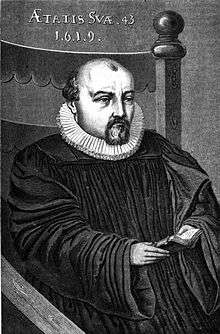Salomon de Caus
Salomon de Caus (1576, Dieppe – 1626, Paris) was a French Huguenot engineer, once (falsely) credited with the development of the steam engine.

Biography
Caus was the elder brother of Isaac de Caus. Being a Huguenot, Caus spent his life moving across Europe.
He worked as an hydraulic engineer and architect under Louis XIII. Caus also designed gardens in England, that of Somerset House among them; also, the Hortus Palatinus, or Garden of the Palatinate, in Heidelberg, Germany.
In 1615, he published a book showing a steam-driven pump similar to one developed by Giovanni Battista della Porta fourteen years earlier. Nevertheless, François Arago called him the inventor of the steam engine as a result.
In this same book, Les Raisons des forces mouvantes, Caus presents[1] a well-known just-intonation scale, now known as the Ellis Duodene, after Alexander John Ellis who reinvented it. It is to Caus that the term work is owed in the sense that it is used in the field of mechanics.[2]
De Caus received a gift of £50 from James VI and I in 1614, and had a pension of £100 from Prince Henry in 1610.[3]
Works
- Hortus Palatinus (1620) at the University of Heidelberg
- La Perspective avec la raison des ombres et miroirs (1611)
- Les Raisons des forces mouvantes (1615)
References
- David J. Benson, Music: a mathematical offering
- Dugas, Rene (1988). A History of Mechanics. Dover. p. 128.
- John Nichols, The Progresses Processions, and Magnificient Festivities of King James the First, vol. 3 (London, 1828), p. 77.
External links
| Wikimedia Commons has media related to Salomon de Caus. |